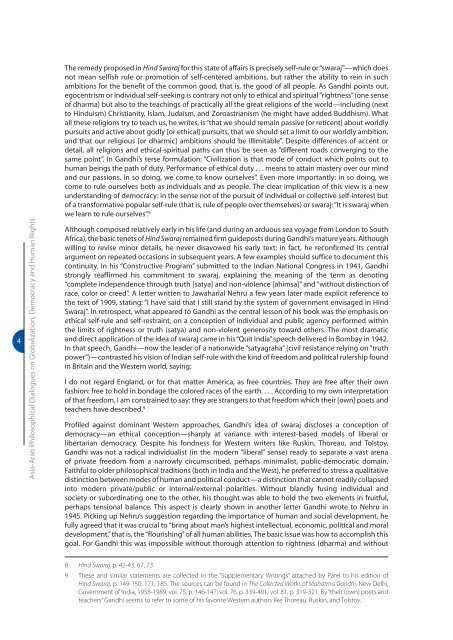Asian-Arab philosophical dialogues on globalization, democracy ...
Asian-Arab philosophical dialogues on globalization, democracy ...
Asian-Arab philosophical dialogues on globalization, democracy ...
You also want an ePaper? Increase the reach of your titles
YUMPU automatically turns print PDFs into web optimized ePapers that Google loves.
4<br />
Asia-<str<strong>on</strong>g>Arab</str<strong>on</strong>g> Philosophical Dialogues <strong>on</strong> Globalizati<strong>on</strong>, Democracy and Human Rights<br />
The remedy proposed in Hind Swaraj for this state of affairs is precisely self-rule or “swaraj”—which does<br />
not mean selfish rule or promoti<strong>on</strong> of self-centered ambiti<strong>on</strong>s, but rather the ability to rein in such<br />
ambiti<strong>on</strong>s for the benefit of the comm<strong>on</strong> good, that is, the good of all people. As Gandhi points out,<br />
egocentrism or individual self-seeking is c<strong>on</strong>trary not <strong>on</strong>ly to ethical and spiritual “rightness” (<strong>on</strong>e sense<br />
of dharma) but also to the teachings of practically all the great religi<strong>on</strong>s of the world—including (next<br />
to Hinduism) Christianity, Islam, Judaism, and Zoroastrianism (he might have added Buddhism). What<br />
all these religi<strong>on</strong>s try to teach us, he writes, is “that we should remain passive [or reticent] about worldly<br />
pursuits and active about godly [or ethical] pursuits, that we should set a limit to our worldly ambiti<strong>on</strong>,<br />
and that our religious [or dharmic] ambiti<strong>on</strong>s should be illimitable”. Despite differences of accent or<br />
detail, all religi<strong>on</strong>s and ethical-spiritual paths can thus be seen as “different roads c<strong>on</strong>verging to the<br />
same point”. In Gandhi’s terse formulati<strong>on</strong>: “Civilizati<strong>on</strong> is that mode of c<strong>on</strong>duct which points out to<br />
human beings the path of duty. Performance of ethical duty . . . means to attain mastery over our mind<br />
and our passi<strong>on</strong>s. In so doing, we come to know ourselves”. Even more importantly: in so doing, we<br />
come to rule ourselves both as individuals and as people. The clear implicati<strong>on</strong> of this view is a new<br />
understanding of <strong>democracy</strong>: in the sense not of the pursuit of individual or collective self-interest but<br />
of a transformative popular self-rule (that is, rule of people over themselves) or swaraj: “It is swaraj when<br />
we learn to rule ourselves”. 8<br />
Although composed relatively early in his life (and during an arduous sea voyage from L<strong>on</strong>d<strong>on</strong> to South<br />
Africa), the basic tenets of Hind Swaraj remained firm guideposts during Gandhi’s mature years. Although<br />
willing to revise minor details, he never disavowed his early text; in fact, he rec<strong>on</strong>firmed its central<br />
argument <strong>on</strong> repeated occasi<strong>on</strong>s in subsequent years. A few examples should suffice to document this<br />
c<strong>on</strong>tinuity. In his “C<strong>on</strong>structive Program” submitted to the Indian Nati<strong>on</strong>al C<strong>on</strong>gress in 1941, Gandhi<br />
str<strong>on</strong>gly reaffirmed his commitment to swaraj, explaining the meaning of the term as denoting<br />
“complete independence through truth [satya] and n<strong>on</strong>-violence [ahimsa]” and “without distincti<strong>on</strong> of<br />
race, color or creed”. A letter written to Jawaharlal Nehru a few years later made explicit reference to<br />
the text of 1909, stating: “I have said that I still stand by the system of government envisaged in Hind<br />
Swaraj”. In retrospect, what appeared to Gandhi as the central less<strong>on</strong> of his book was the emphasis <strong>on</strong><br />
ethical self-rule and self-restraint, <strong>on</strong> a c<strong>on</strong>cepti<strong>on</strong> of individual and public agency performed within<br />
the limits of rightness or truth (satya) and n<strong>on</strong>-violent generosity toward others. The most dramatic<br />
and direct applicati<strong>on</strong> of the idea of swaraj came in his “Quit India” speech delivered in Bombay in 1942.<br />
In that speech, Gandhi—now the leader of a nati<strong>on</strong>wide “satyagraha” (civil resistance relying <strong>on</strong> “truth<br />
power”)—c<strong>on</strong>trasted his visi<strong>on</strong> of Indian self-rule with the kind of freedom and political rulership found<br />
in Britain and the Western world, saying:<br />
I do not regard England, or for that matter America, as free countries. They are free after their own<br />
fashi<strong>on</strong>: free to hold in b<strong>on</strong>dage the colored races of the earth. . . . According to my own interpretati<strong>on</strong><br />
of that freedom, I am c<strong>on</strong>strained to say: they are strangers to that freedom which their [own] poets and<br />
teachers have described. 9<br />
Profiled against dominant Western approaches, Gandhi’s idea of swaraj discloses a c<strong>on</strong>cepti<strong>on</strong> of<br />
<strong>democracy</strong>—an ethical c<strong>on</strong>cepti<strong>on</strong>—sharply at variance with interest-based models of liberal or<br />
libertarian <strong>democracy</strong>. Despite his f<strong>on</strong>dness for Western writers like Ruskin, Thoreau, and Tolstoy,<br />
Gandhi was not a radical individualist (in the modern “liberal” sense) ready to separate a vast arena<br />
of private freedom from a narrowly circumscribed, perhaps minimalist, public-democratic domain.<br />
Faithful to older <str<strong>on</strong>g>philosophical</str<strong>on</strong>g> traditi<strong>on</strong>s (both in India and the West), he preferred to stress a qualitative<br />
distincti<strong>on</strong> between modes of human and political c<strong>on</strong>duct—a distincti<strong>on</strong> that cannot readily collapsed<br />
into modern private/public or internal/external polarities. Without blandly fusing individual and<br />
society or subordinating <strong>on</strong>e to the other, his thought was able to hold the two elements in fruitful,<br />
perhaps tensi<strong>on</strong>al balance. This aspect is clearly shown in another letter Gandhi wrote to Nehru in<br />
1945. Picking up Nehru’s suggesti<strong>on</strong> regarding the importance of human and social development, he<br />
fully agreed that it was crucial to “bring about man’s highest intellectual, ec<strong>on</strong>omic, political and moral<br />
development,” that is, the “flourishing” of all human abilities. The basic issue was how to accomplish this<br />
goal. For Gandhi this was impossible without thorough attenti<strong>on</strong> to rightness (dharma) and without<br />
8 Hind Swaraj, p. 42-43, 67, 73.<br />
9 These and similar statements are collected in the “Supplementary Writings” attached by Parel to his editi<strong>on</strong> of<br />
Hind Swaraj, p. 149-150, 171, 185. The sources can be found in The Collected Works of Mahatma Gandhi. New Delhi,<br />
Government of India, 1958-1989, vol. 75, p. 146-147; vol. 76, p. 339-401; vol. 81, p. 319-321. By “their (own) poets and<br />
teachers” Gandhi seems to refer to some of his favorite Western authors like Thoreau, Ruskin, and Tolstoy.

















